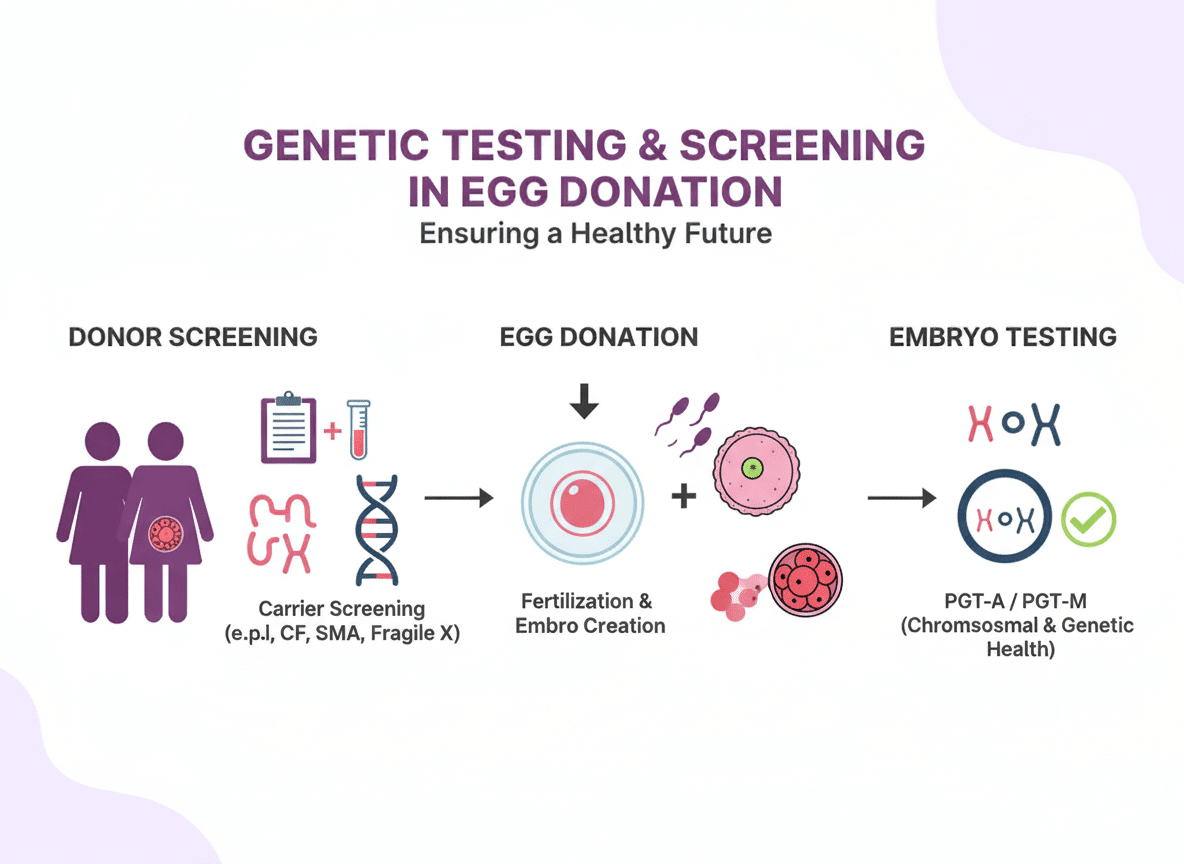Egg donation is not just about selecting a donor and undergoing IVF. For Indian intended parents in the USA, genetic testing and screening play a vital role in ensuring a healthy pregnancy and baby. With inherited conditions being more prevalent in certain ethnic groups, genetic screening provides peace of mind and significantly improves outcomes.
Why Genetic Testing Matters
- Prevents transmission of inherited disorders
- Improves embryo selection and success rates
- Helps avoid emotional and financial strain of failed cycles
- Provides clarity for parents planning future children
Types of Genetic Testing in Egg Donation
Donor Genetic Carrier Screening :
- Donors are tested for 300–600+ genetic conditions.
- Screening identifies carriers of diseases like thalassemia, sickle cell anemia, cystic fibrosis, Tay-Sachs.
- Especially important for Indian donors, as thalassemia is more common in South Asian populations.
Embryo Genetic Testing (PGT-A / PGT-M) :
- PGT-A (Preimplantation Genetic Testing for Aneuploidy): Screens embryos for chromosomal abnormalities.
- PGT-M (Preimplantation Genetic Testing for Monogenic conditions): Screens for specific inherited diseases.
- Increases implantation rates and reduces miscarriage risk.
Infectious Disease Screening :
- Donors undergo FDA-mandated testing for HIV, hepatitis, syphilis, and other infections.
The Process of Genetic Testing
- Donor screening: Conducted before acceptance into donor program.
- Embryo testing: Performed after fertilization, before transfer.
- Results consultation: Genetic counselor explains findings to parents.
- Embryo selection: Only chromosomally normal, healthy embryos are transferred.
Costs of Genetic Testing
- Donor carrier screening: $500–$1,500
- Embryo genetic testing (PGT-A): $4,000–$7,000 per cycle
- PGT-M (targeted disease testing): $4,000–$10,000
- Worth the investment for higher success rates and lower miscarriage risk.
Benefits for Indian Parents
- Prevents thalassemia major and other conditions more common in Indian populations.
- Ensures a healthier pregnancy and baby.
- Helps parents feel confident about long-term health outcomes.
Case Study – Preventing Genetic Risk
Ravi and Shreya matched with an Indian donor who tested positive as a carrier for thalassemia. Because screening was done early, they selected a different donor who was not a carrier, avoiding serious complications for their child.
Testimonials
“We didn’t realize how important genetic testing was until our counselor explained it. It gave us peace of mind.” – A.S., Parent, NJ
“The extra cost was worth it. We now have two healthy embryos waiting for transfer.” – M.P., Parent, CA
FAQ
Q: Is genetic testing required for egg donors?
Ans : Yes, FDA guidelines mandate screening, but agencies like IndianEggDonors.com go beyond requirements with advanced panels.
Q: Do all embryos need to be tested?
Ans : Not required, but strongly recommended for higher success rates.
Q: Can Indian parents skip genetic testing?
Ans : It’s risky. Many conditions have no symptoms in carriers but can affect children if both parents are carriers.
Q: Does testing harm the embryo?
Ans : No, biopsy is done at the blastocyst stage with minimal risk.
Conclusion & Call to Action
Genetic testing and screening are essential steps for Indian intended parents pursuing egg donation. They ensure healthier outcomes, reduce risks, and provide peace of mind for families.
Protect your future family with genetic testing :

Dr. Pooja Patel
Dr. Pooja Patel is a Chief Surrogacy Coordinator at Surrogacy4all. She has 10 years of experience in Anesthesiology and critical care medicine.
She received her medical degree from Seth GS Medical College and K.E.M Hospital in India. She then completed an internship. She finished her Anesthesia residency at Grant Govt Medical College and JJ Group of Hospitals in India.










